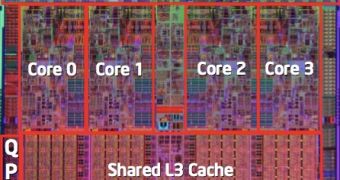So many words have been spent, either in writing or in speech, on the arrival of Intel's new Nehalem processors, that some users might actually deem them old history. Still, Intel's new CPU architecture is yet to be revealed and although the company has even demonstrated the performance capabilities of its soon-to-come desktop processors, some of us prefer to wait until the CPUs finally arrive before passing any kind of judgment, be it good or bad. And, because the new processing units are expected to be released sometime at the end of this year, for now, we will just have to settle for any news we can get our hands on.
According to recent reports, the Santa Clara-based chip manufacturer is going to introduce a trio of desktop processors based on its next-generation "Nehalem" architecture in Q4. However, for the time being, this is just an unconfirmed rumor coming from an Asian motherboard-maker, so skepticism might be in order.
In the fourth quarter of 2008, users will witness the introduction of a pair of mainstream desktop quad-core parts and a single Extreme chip, aimed at providing computing power to gamers.
All three chips are part of the codenamed "Bloomfield" series. The Extreme, gaming oriented CPU is expected to be clocked at 3.2 GHz and to connect directly to 1333MHz DDR3 memory. The other Bloomfields will reportedly come with 2.93GHz and 2.66GHZ, respectively. These two will connect to 1066MHz DDR3 memory.
Intel's Nehalem chips will use Intel's new QuickPath Interconnect (QPI) bus technology. The Extreme CPU is expected to come with a bus tuned to deliver 6.4bn transactions per second (GT/s), while the mainstream desktop chip's QPI bus runs at 4.8GT/s, according to sources.
All of the above-mentioned CPUs will require an LGA1366 socket in order to get started. They will contain 8MB of L3 cached shared across all four cores and all but one will support the usual Intel extension technologies. The same sources claim that TXT (Trusted eXecution Technology) will most likely not be enabled on these chips.

 14 DAY TRIAL //
14 DAY TRIAL //